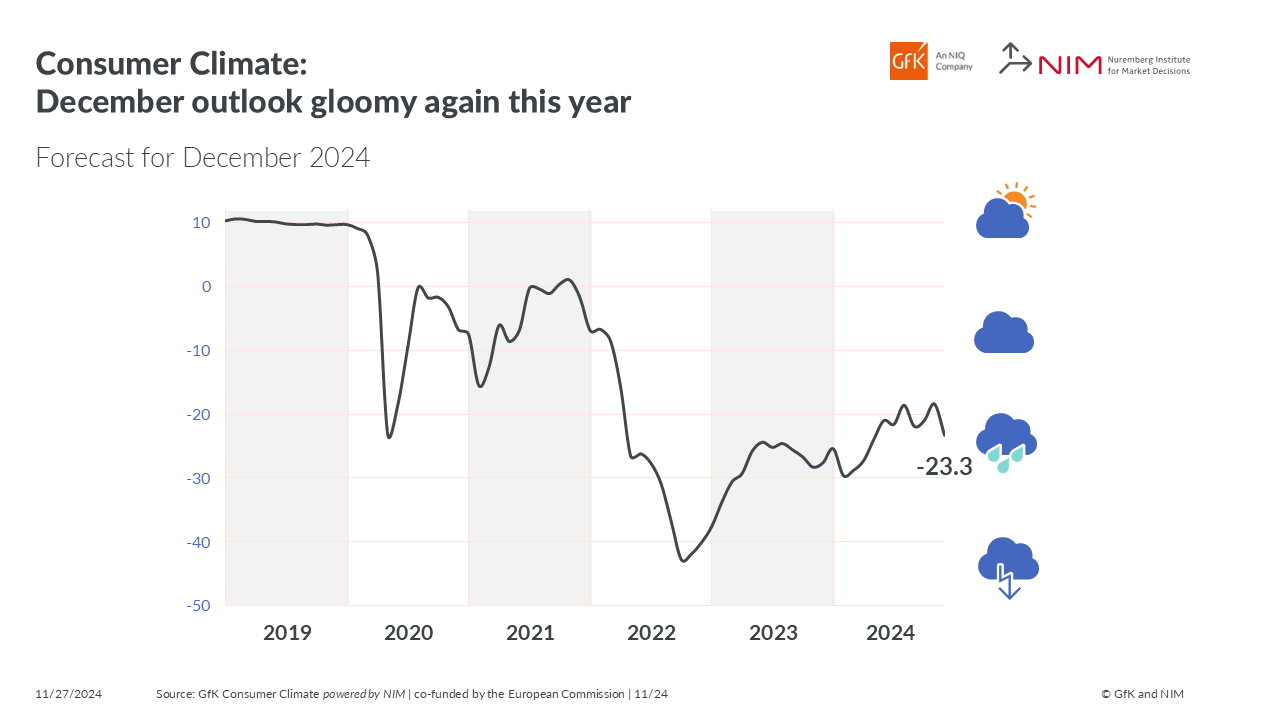Consumer sentiment in Germany declined significantly in November.
Nuremberg, November 27, 2024 – Consumer sentiment in Germany declined significantly in November: income expectations fall sharply and the willingness to buy declines slightly. As the willingness to save rises at the same time, the forecast for the last month of this year decreases significantly. Compared to the previous month, the consumer climate for December goes down 4.9 points (revised -18.4 points) to -23.3 points – a similar level to December 2023. German consumers are also more pessimistic about the development of the general economic situation for the fourth time in a row. This is shown by the latest results of the GfK Consumer Climate powered by NIM. It has been published jointly by GfK and the Nuremberg Institute for Market Decisions (NIM), founder of GfK, since October 2023.
In particular, the significant decrease in income expectations for the next 12 months, as well as a slight decline in the willingness to buy, erase the recent recovery in consumer sentiment. A renewed rise in the willingness to save, which increased by 4.7 points, reinforces the negative trend.
“The final weeks of the year end with a significant setback in consumer sentiment. The -23.3 points measured for December are the lowest level since May of this year (May 2024: -24 points). Consumer sentiment in Germany is therefore currently at a level comparable to the end of 2023,” explains Rolf Bürkl, consumer expert at NIM. “Consumer uncertainty has increased again recently, as evidenced by the rising willingness to save. There is also another uncertainty factor: concerns about job security in Germany are growing. The reasons for this are certainly the job cuts reported by industry and the relocation of production abroad. In addition, the number of insolvencies has risen recently. In short, the consumer climate remains poor.”
Recession worries continue to grow
Initial hopes of a cautious economic recovery faded during the year. Germans continue to take a pessimistic view of the general economic situation in Germany in the coming 12 months: The economic indicator falls to -3.6 points after a drop of 3.8 points. This is already the fourth decline in a row. A lower value for the economic outlook was last measured in February 2024 with -6.4 points.
Rising insolvency figures and reports of impending job losses further dampen economic expectations. Both economic experts and the German government have revised their growth forecasts for this year downwards to a “red zero”. The forecasts for next year are also rather modest, with gross domestic product expected to grow by just 0.4 percent.
Income expectations fall to a nine-month low
In November, consumers’ income expectations for the coming year fell due to growing fears of recession. The indicator lost 17.2 points, plummeting to -3.5 points. A worse value was last measured 9 months ago, in February 2024, at -4.8 points.
Growth forecasts for this year and next have been revised downwards and unemployment has been on the rise again for some time. As a result, German consumers are once again less optimistic about their expected income situation. Especially as the expected wage increase of around 2 percent in 2025 means that real income growth is likely to be a thing of the past.
Willingness to buy with slight losses
In the wake of falling income expectations, the willingness to buy also shows slight losses. The indicator loses 1.3 points and now stands at -6 points. Compared to the same period last year, the increase is currently 9 points. However, the willingness to buy is below the level at the time of the two lockdowns in spring 2020 and early 2021. The level of willingness to buy remains extremely low.
The following diagram shows how the Consumer Climate indicator has developed over recent years:

Planned publication dates 2024/1st half of 2025 (CET):
- Thursday, 19.12.2024, 8:00 a.m
- Wednesday, 29.1.2025, 8:00 a.m.
- Wednesday, 26.2.2025, 8:00 a.m.
- Friday, 28.03.2025, 8:00 a.m.
- Tuesday, 29.4.2025, 8:00 a.m.
- Tuesday, 27.5.2025, 8:00 a.m.
- Thursday, 26.6.2025, 8:00 a.m.
About our method
The survey period for the current analysis was October 31 to November 11, 2024. The results are extracted from the “GfK Consumer Climate powered by NIM” study and are based on around 2,000 consumer interviews per month conducted on behalf of the European Commission. The report presents the indicators in the form of graphics accompanied by brief comments. Consumer sentiment refers explicitly to all private consumer spending. Depending on the definition used, however, retail accounts for only around 30 percent of private consumer spending. Services, travel, housing costs, healthcare services, and the wellness sector as a whole account for the rest. Again, this does not apply to retail sales, but instead to total consumer spending. Like all other indicators, willingness to buy is a confidence indicator. It indicates whether consumers currently consider it advisable to make larger purchases. Even if they answer “Yes” to this question, there are two further requirements for making a purchase: The consumer must have both money required for such a large purchase and must also see a need to make this purchase. Furthermore, this only concerns durable consumer goods that also require a larger budget.
GfK Consumer Climate powered by NIM
The GfK Consumer Climate survey, which is being conducted regularly since 1974 and monthly since 1980, is regarded as an important indicator of German consumer behavior and a guiding light for Germany’s economic development. Since October 2023, the Consumer Climate data collected by GfK has been analyzed and published jointly with the Nuremberg Institute for Market Decisions (NIM), the founder of GfK. By joining forces, it will be possible to invest further in the analysis and development of the Consumer Climate study to gain an even better understanding of the background to changes in consumer confidence.
About GfK – a NielsenIQ company
For 90 years, clients around the world have trusted us to provide data-driven answers to key questions for their decision-making processes. We support their growth through our comprehensive understanding of buying behavior and the dynamics that influence markets, brands, and media trends. In 2023, industry leaders GfK and NielsenIQ have merged to offer their clients unparalleled global reach. With a holistic view of retail and the most comprehensive consumer insights, provided by forward-looking analytics on state-of-the-art platforms, GfK is driving “Growth from Knowledge.”
About NIM
The Nuremberg Institute for Market Decisions (NIM) is a non-profit research institute at the interface of academia and practice. NIM examines how consumer decisions change due to new technology, societal trends or the application of behavioral science, and what the resulting micro- and macroeconomic impacts are for the market and for society as a whole. A better understanding of consumer decisions and their impacts helps society, businesses, politics, and consumers make better decisions with regard to “prosperity for all” in the sense of the social-ecological market system. The Nuremberg Institute for Market Decisions is the founder of GfK. Further information is available at https://www.nim.org.




